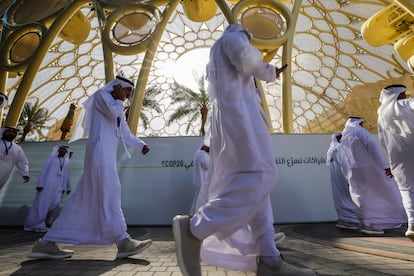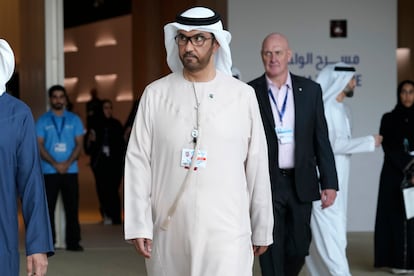The paradox of COP28 in Dubai: The urgent battle to end fossil fuels being waged in a ‘petrostate’
The United Arab Emirates will host the U.N.’s annual climate conference starting this Thursday, with the uncertainty of how it will affect the country presiding over the negotiations


In this race against time it is a thousand times easier to agree on what to start doing than on what to stop doing. In order for global warming not to exceed the safety limits that countries imposed on themselves with the Paris Agreement in 2015, the world economy must stop emitting greenhouse gases during the second half of this century. To reach this goal, a clear route must be followed in the next three decades that moves away from fossil fuels (coal, gas and oil), the main source of emissions. This disengagement must begin as soon as possible, and the clearest alternative is the use of renewables. This will be discussed by the representatives of the almost 200 nations that are meeting at the annual U.N. climate summit, COP28, which starts this Thursday and is due to close on December 12 — in principle, because the end of these meetings is always delayed by ongoing negotiations.
What is different about this summit is that it is being held in the United Arab Emirates (UAE), one of the world’s biggest oil and gas producing countries. The conference itself will take place at the Expo City development in Dubai. There is a great deal of uncertainty and concern among activists and some countries about how the outcome of this event may be affected by the fact that, for the first time, the host is a “petrostate.” The UAE has a population of a little more than nine million, and 29% of the country’s income depends on the oil and gas industry.
Before the event started, there was already a certain consensus that COP28 would issue a call to triple global renewable power by the end of this decade, which means going from 3,400 gigawatts (GW) in 2022 to around 11,000 in 2030. The same package includes doubling energy efficiency rates, in other words, reducing energy use, and the G20 adopted these goals at its September meeting in India. Furthermore, in a joint climate declaration a few days ago, China and the United States (whose senior leaders will not ultimately attend COP28, although they will send high-level delegations) also showed their explicit support for the global objective of tripling renewable power. This is seen as something that is within reach thanks to the increasingly competitive solar and wind technologies.
But that is the simple part. The complicated part is achieving the same call for what we must stop doing, which means eliminating the use of fossil fuels. This will be the summit’s “biggest battle, but not the only one,” the Spanish delegation in Dubai believes. This year, Spain will have a prominent role in the negotiations when it receives the rotating presidency of the Council of the European Union. While each country’s delegates discuss the issue of climate change, alerts will be sounded in the background, reminding them that emissions have not yet reached their ceiling and this year will be the warmest ever recorded.
Although the worldwide implementation of renewables is gaining speed, fossil fuel-producing countries are not now considering the reductions in oil, gas, and coal extraction necessary to stop warming. A recent study sponsored by UNEP, the U.N. environmental agency, warned that governments are currently considering producing more than double the amount of fossil fuels in 2030 than would be compatible with limiting warming to 1.5 degrees. That figure was one of the goals set in the Paris Agreement. The United Arab Emirates — which is the seventh-largest oil producer in the world and the fifteenth largest gas producer — has multimillion-dollar investments planned to further expand its production during this decade. In addition, it is among the states that grant the most state aid per capita to the fossil fuel industry: $2,466 per year, according to a report by the International Monetary Fund.
Holding the summit in Dubai has highlighted the contradictions in the global fight against climate change, and raised tensions the previous times. The event has been surrounded by controversy since it was announced months ago that Sultan al Jaber, the Emirates Minister of Industry, will preside over the COP. He has already represented his country on several occasions at previous COPs and, in addition to being a minister, he is the CEO of ADNOC (Abu Dhabi National Oil Company), the eighth-largest oil company in the world. This week the BBC published a series of documents that suggest that the COP presidency could take advantage of this event to try to expand its businesses, something that would clearly contravene the U.N. rules for these summits. “I can’t believe it,” U.N. Secretary General António Guterres responded on Monday when questioned about the matter.
At a conference held ahead of the summit this Wednesday, Sultan al Jaber finally responded to this information. “These allegations are false, not true, incorrect, and not accurate,” said the UAE minister, who has promised that he has never seen or used these documents in his meetings. And he added: ”Do you think that the United Arab Emirates or I need the COP or the presidency of the COP to establish trade agreements or trade relations?”

In any case, how is it possible that the United Arab Emirates can host and chair a climate summit? “We must understand that the COPs are the result of a multilateral process where all countries are treated equally,” explains Manuel Pulgar, the former Peruvian minister who chaired the summit held in his country in 2014. “The smallest of economies must be heard like the rest,” he explains. Laurence Tubiana, one of the architects of the Paris Agreement, emphasizes that the COP system “holds all countries responsible for a problem that affects everyone,” such as climate change. “That includes the main fossil fuel producing states,” he adds.
Every year the event is held in a particular region of the planet. In 2023, it was Asia’s turn to host the COP, the Emirates presented its candidacy, which was supported by the countries of that region and the rest of the almost 200 nations participating in the climate change negotiations. Pulgar remembers that in 2018 the Polish city of Katowice hosted COP24. If Dubai is one of the homelands of oil, Katowice was the homeland of coal in the European Union, where Poland is one of the least ambitious countries in the climate fight.
COP24 did not go down in history as the most audacious of summits, but what had the most influence, beyond the Polish presidency, was the blocking posture imposed by the United States, then governed by Republican Donald Trump. Theoretically, the COP presidency should be neutral. “It must represent the global interest and not that of its country,” says Pulgar. “When trust in the presidency of the summit is broken, the COP collapses,” he warns. “The presidency must be impartial and overcome conflicts of interest,” Tubiana also warns.
Overall balance
The meeting that begins this Thursday has the mandate to carry out the first assessment of global efforts to contain climate change since the signing of the Paris Agreement in 2015. It is already known that not enough has been done because warming is predicted to be above what was agreed, so the world’s governments must change course. The pact signed in the French capital eight years ago established the goal that the increase in the average temperature of the planet would not exceed two degrees by the end of the century compared to pre-industrial levels, and to try not to exceed 1.5 degrees. To do this, it is necessary to reduce emissions, although specific cuts are not set by each nation. Instead, each country has presented its plans for voluntary cuts, which will now lead the planet to between 2.1 and 2.8 degrees of warming.
“This situation requires urgent action,” says Tubiana, who adds as a warning: “There is a fundamental incompatibility between dependence on fossil fuels and achieving our climate goals.” The balance must be used to draw up the next batch of national plans to cut emissions, which will be presented in 2025. Also, it is essential for these plans to contain promises and national calendars to stop using fossil fuels, as António Guterres himself has pointed out. Hence the importance of this call coming out of the Dubai summit.
For now, Sultan al Jaber insists on the need to involve oil and gas companies in this fight. It highlights that it is “the first time” that the majority of companies in this sector are committed to achieving carbon neutrality goals. However, many analysts fear that these commitments are nothing more than eco-posturing or greenwashing while extraction continues to increase, condemning humanity to disastrous warming. The criticism doesn’t just come from angry environmentalists. Fatih Birol, executive director of the International Energy Agency (IEA), has questioned the commitment of these companies to the energy transition. Only 1% of the $1.8 trillion that will be invested in renewable energy in 2023 will come from fossil fuel companies, a recent IEA report highlighted.
The big question is what will come out of COP28 in relation to fossil fuels. Once again the summit’s final statement may end up being watered down. But, if it doesn’t go wrong, it seems that good news will come out of the summit. A fund to compensate the most vulnerable regions for the impacts of climate change for which they are the least responsible will be established. This fund, which will be managed by the World Bank, is expected to start after this summit, but the most important thing will be the commitments that will come later to provide it with funds. Developed nations will contribute, but the door is also open for other countries, such as China, to do so too and to seek other alternative energy sources.
Sign up for our weekly newsletter to get more English-language news coverage from EL PAÍS USA Edition
Tu suscripción se está usando en otro dispositivo
¿Quieres añadir otro usuario a tu suscripción?
Si continúas leyendo en este dispositivo, no se podrá leer en el otro.
FlechaTu suscripción se está usando en otro dispositivo y solo puedes acceder a EL PAÍS desde un dispositivo a la vez.
Si quieres compartir tu cuenta, cambia tu suscripción a la modalidad Premium, así podrás añadir otro usuario. Cada uno accederá con su propia cuenta de email, lo que os permitirá personalizar vuestra experiencia en EL PAÍS.
¿Tienes una suscripción de empresa? Accede aquí para contratar más cuentas.
En el caso de no saber quién está usando tu cuenta, te recomendamos cambiar tu contraseña aquí.
Si decides continuar compartiendo tu cuenta, este mensaje se mostrará en tu dispositivo y en el de la otra persona que está usando tu cuenta de forma indefinida, afectando a tu experiencia de lectura. Puedes consultar aquí los términos y condiciones de la suscripción digital.








































